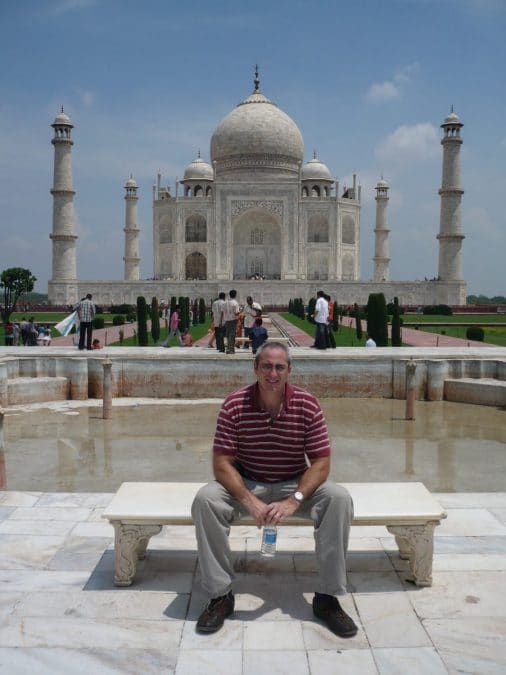Citizen Potawatomi Nation member Andrew Jenks, Ph.D., returned to Tribal headquarters summer 2018 to visit family and learn more about his CPN heritage. His experience while in Oklahoma motivated Dr. Jenks to analyze Native American traditions and teachings. He then incorporate the lessons into his lectures at California State University, Long Beach.
“The trip to Shawnee — after stopping in my father’s hometown nearby of Purcell — was a revealing, profound and mystical experience for me about a part of my identity I never really contemplated beyond occasionally taking out the Tribal membership card I received way back in the 1980s,” Dr. Jenks said.

His father was Potawatomi and a Bertrand descendant, and his mother’s parents were refugees from the Russian Revolution. Their experience fleeing the country inspired Jenks to study Russian language and culture in college and graduate school. Until recently, Jenks had not thought much about his Potawatomi heritage. However, he instantly felt a sense of peace and pride when he arrived at the Nation’s headquarters.
“The experience — one of the more profound moments in my life, at a time when I was still grieving for my father’s passing — was a fitting re-introduction to my Potawatomi roots, connecting me so intimately to the headquarters and launching me into a tour of the excellent and enlightening exhibit about the history and culture of the Tribe,” Dr. Jenks said. “It was at this moment that I first began to consider myself ‘Potawatomi’ and acquired some meaningful sense of myself in relationship to Tribal history.”
For many years, Dr. Jenks struggled with what it means to be Potawatomi. He now realizes Tribal connections and involvement help define that identity.
“What it means to be a member of the Tribe is to simply participate in the culture,” Dr. Jenks said. “If you’re formally a member, but you don’t feel like it, then participate; read about it, study the language and put yourself somehow into that culture.”
Lectures
Dr. Jenks serves as a professor within California State University’s history department teaching Russian history and the effects of modern environmental disasters.
“I think that one of the things that many Native American tribes have is they ask the question of ‘Why?’ Not just, ‘Can we do it?’ But, ‘Should we do it?’ And that’s something that’s valuable,” he added.
He injects these ideologies in his classes and book, The Perils of Progress: Environmental Disasters in the Twentieth Century.
“There is a connection between economic exploitation and development and Indigenous people,” Dr. Jenks explained. “So much of the land, so much of the resources that are exploited and much of the pollution is created as a result of exploitation. The burden of that is felt by Indigenous peoples.”
He also draws an association between a willingness to sacrifice Indigenous peoples for the sake of industrial modernization and development.
“Part of the reason I think we need to be aware of this legacy of colonization continues in the form of pollution, and many Native Americans and Indigenous peoples around the world are continually exposed to it in addition to economic exploitation,” he said. “The term that’s used in environmental studies is environmental justice.”
According to its website, the Environmental Protection Agency defines environmental justice as “the fair treatment and meaningful involvement of all people regardless of race, color, national origin, or income with respect to the development, implementation and enforcement of environmental laws, regulations and policies.”
“There is a connection between economic and social justice and political inequality,” Dr. Jenks said. “If you don’t have power, if you don’t have political equality, you’re going to suffer more than other groups.”
When building new infrastructure, businesses and industries, he encourages developers to ask whether the project will provide long-term, positive impacts that expand beyond the bottom line.
“Blind faith in technology and science can lead to something destructive sometimes, and it’s not always something that’s good,” he said.
Career plans
Dr. Jenks plans to retire in 10 to 15 years, and as the next chapter in life approaches, he contemplates what final research he will complete.
“I’ve been thinking that project might look more directly at Potawatomi and American History, my own personal relationship to that … as opposed to academic, objective or scientific — something that sort of injects myself into the story much more explicitly than in my past research,” Dr. Jenks said.
He enjoys researching and delving into a variety of topics, writing and lecturing on the subjects that interest him the most, attesting that “living the good life means learning something new every day.”
Read more about Dr. Jenks, his research and published books at cpn.news/andrewjenks.
